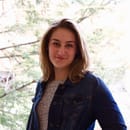I got the chance to interview my roommate, who took part in a study here on campus over the summer.
HerCampus: So what did you do when you were on campus this summer?
Kaitlyn: I spent the summer looking at the effects of nicotine on larval zebrafish. We are trying to essentially create a genetic strain of zebrafish that seek out nicotine if they are exposed to it. This will help us in future studies that relate to smoking and it’s addictive qualities. As it turns out, about 20 percent of juvenile zebrafish actively seek and look for nicotine if they are given the chance, and we want to work with these fish only, because in future studies, we want to isolate the behavior that emulates a smoker. This study has been ongoing since 2009, and 75 students altogether have worked on this. It’s kind of cool to get to be part of this! Once we have a strain of zebrafish that emulate the qualities of a smoker, we can begin studying how addiction can be blocked and/or prevented.
HC: That’s really interesting! What was your favorite part? Least favorite part?
Kaitlyn: I loved the lab group, and I got lots of experience in what you actually do as a scientist. It was also cool learning about zebrafish, and very cool to see applications of this study and where it is going to lead society in the future.
HC: What was the hardest part about this study?
Kaitlyn: Sometimes it can get repetitive to do the same behavior tests over and over again, and that was what I spent a huge amount of time on. However, the analysis of those tests really kept it interesting, so there were ways to work with this negative aspect. The other thing that I found frustrating was just not knowing the answers to questions that were raised in the study. The more you get into science, you realize your answers are really just other questions— things that will lead you to further study. It isn’t like doing a lab in a class where you know that there is some sort of end goal that you will eventually reach, and while that is incredibly exciting, it’s also somewhat frustrating in the moment.
HC: That makes sense, but it’s good that you kind find the positives in these sorts of situations! Now, tell me about the people you got to work with!
Kaitlyn: I was in the behavioral section of the lab with three other people. There was a girl in the molecular section this summer too that I got to know as well. We all got along, which was nice. All of the other people were seniors, which means they were preparing for MCAT exams, and I got all kinds of advice about that, so that was nice. I’m glad I got to meet other neuroscience majors, that was cool too.
HC: So how did you get into this study?
Kaitlyn: Professor Schneider, my advisor, runs this study, and he always talks about it. Since this study has been going on so long, I actually knew about it before I applied to DePauw, and it was something I always wanted to work with. So I actually just asked my professor if I could work with him, and he was willing to have me work for him! At the beginning of my second semester sophomore year, I got trained in using the equipment, so that I would be ready to work with the zebrafish once the summer rolled around. Honestly, one of the best things about having Schneider as my advisor is that he really encourages undergrad research!
HC: What was it like being here over the summer?
Kaitlyn: I was lucky to have fun people to live with, but even still, Greencastle can get boring. I found out about Trivia Night Thursday at Wasser Brewing Co, and that was fun. I spent lots of time in the lab, and went to the gym and cooked a lot. I got to catch up on sleep. Days could get a little monotonous, but I tried to seek out good things.
HC: What was your biggest takeaway from the experience?
Kaitlyn: That’s hard. On the science side of things, I learned a lot about lab protocol, doing research and looking for papers, and developing new methods when your old ones don’t work. I think I learned to get along with people, and have a peer support group. I also got to go to a conference to present research, where I learned a lot about how to speak to older professors. You really have to know your stuff, people at conferences have questions and want you to justify everything. You need to be ready to defend what you were doing! I think that happens a lot with undergrad research though, because oftentimes it’s not taken seriously, like it is here at DePauw. We’re very lucky here!



